Hong Kong protests: Arrests as Admiralty site is cleared
- Published
"There are no tents, no umbrellas and no protesters in the large numbers we have seen" reports Babita Sharma
More than 200 activists have been arrested in Hong Kong after police cleared the main pro-democracy protest camp at Admiralty.
The dismantling passed off peacefully, but many activists vowed to continue with other forms of civil disobedience.
Police began their operation early on Thursday in what is widely seen as the final act in the long-running protests.
The demonstrations have dwindled in recent weeks from the tens of thousands who turned out in September.
Activists want Beijing to allow free elections for the territory's next leader in 2017. China says everyone can vote but a pro-Beijing committee will screen candidates.
High profile arrests
Watch: Key moments as Hong Kong police clear the protest camp
Police officers started to clear the camp and dismantle tents after issuing orders for protesters to vacate the "occupied area" within 30 minutes or face arrest.
Among those arrested were opposition Democratic Party founder Martin Lee, student leader Nathan Law, media tycoon Jimmy Lai and singer Denise Ho.
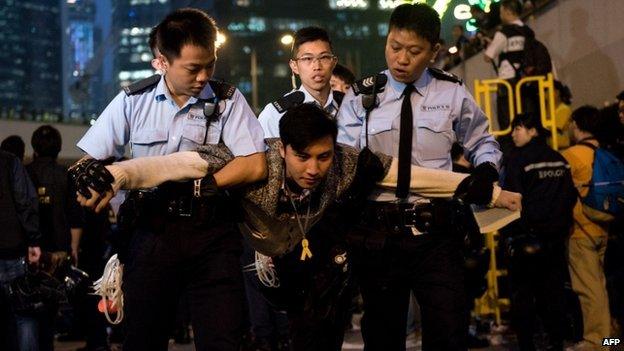
Police officers carried a number of protesters away from Hong Kong's main pro-democracy site
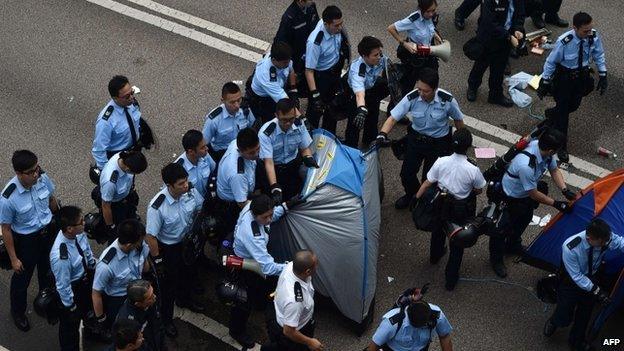
They gave a 30-minute window for demonstrators to leave or face arrest before moving into Admiralty
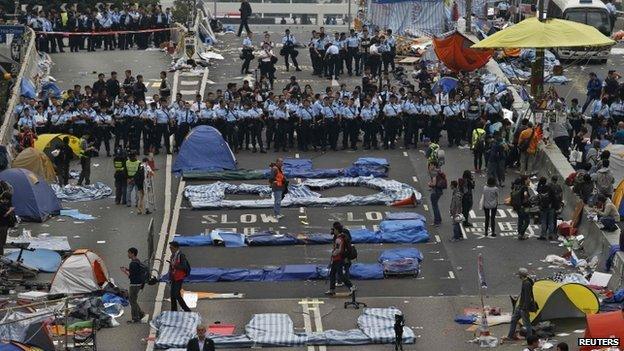
There was a tense standoff as police lined up in preparation to dismantle what remains of the camp
As police approached the last remaining protesters, Alex Chow, head of the Hong Kong Federation of Students, rallied the crowds, saying the fight was not over, AP reports.
Meanwhile, a dozen people who opposed the protests turned up to cheer on the police, the South China Morning Post reports.

At the scene: John Sudworth, BBC News, Hong Kong
The bailiffs were the first in, enforcing a court order to remove barricades on the outer perimeter. They made light work of it. Then, as promised, the police took over, chanting as they moved slowly forward, riot shields hanging ready at their sides, and approaching, in their hundreds, from all sides.
The camp, though, was already largely deserted, with only a few hundred remaining to make their last stand. They were arrested, one by one, hoisted aloft and carried horizontally, face forward and shouting defiantly for "real universal suffrage". Within a matter of hours the camp was no more, as the steel jaws of the disposal trucks crunched up the tents and the other flotsam and jetsam of protest life.
In the end, though, this is a protest movement that has been vanquished not by force, but by fatigue. It had already run out of steam in the face of China's refusal to make any concessions. But for the protesters, while their unique public space, carved out amongst the sky scrapers, is finished, the fight for democracy - they insist - is not.


Earlier in the morning, bailiffs read out a final warning to protesters shortly before workers, backed by police, moved in and began dismantling barricades in one section of the site, using box cutters to remove ties.
Footage from the scene showed police tearing down supply and first aid tents, as well as a study area used by students.
Trucks with cranes were also used to pick up debris left behind from the broken barriers, plastic sheets and umbrellas.
Clear-up monitors
The clearance is the result of a court order obtained by a bus company which says the protests have disrupted its business.
While the order covered three portions of the Admiralty site, including the main Connaught Road area, Hong Kong police spokesman Cheung Tak-keung said officers would also clear blocked roads.
He said they would clear away barricades from a second protest site at Causeway Bay "at an appropriate time". About 20 people remain there, the South China Morning Post reports.
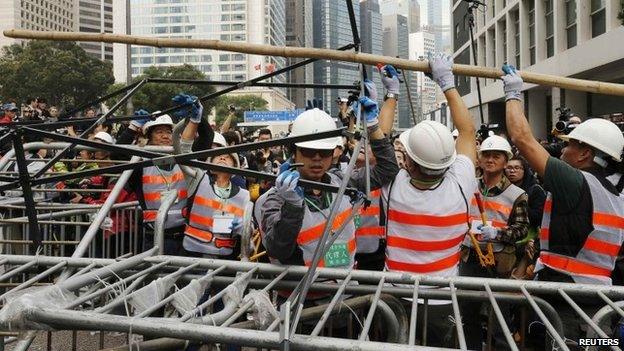
Workers in white hats started cutting into barricades as the clearance operation began
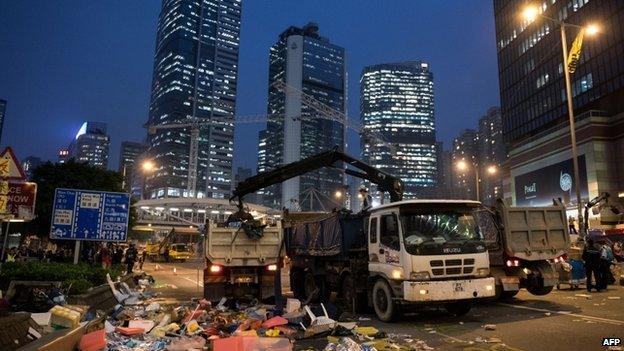
Trucks carrying cranes moved in to clear some of the debris left behind
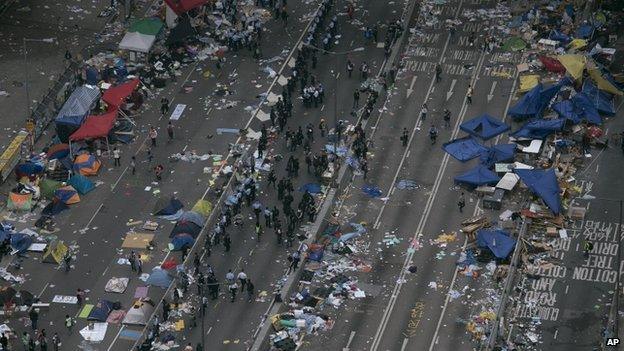
The protests have been blocking the city centre for more than two months
Some pro-democracy politicians joined the students at the site and academics and a police watchdog were monitoring the clearance operation.
Some protesters, however, packed up their tents as Thursday dawned.
"I'll probably leave just before the action because my job would be difficult if my name was recorded by police," one 29-year-old protester told AFP news agency.

Hong Kong protests: Timeline
28 Sept: Occupy Central begins, as activist group brings forward its campaign after students flood the streets; police fire tear gas. Public anger brings more people out.
Late Sep to mid October: Major rallies that swell at weekends take place at three protests sites, but numbers slowly dwindle.
21 Oct: Talks between student leaders and Hong Kong government go ahead - but go nowhere.
26 Nov: Clashes erupt as Mong Kok protest camp is cleared.
3 Dec: Occupy Central leaders end campaign and present themselves to police; student protests continue.

Clashes erupted when a third protest site, at Mong Kok, was cleared last month. On Wednesday, Hong Kong's top civil servant Carrie Lam urged students to leave the Admiralty site peacefully.
Later that night, more than 10,000 people gathered at the protest site, chanting pro-democracy slogans in what many saw as a farewell to the current demonstrations.
At their height, the protests were seen as the biggest challenge to Beijing's rule in Hong Kong since the 1997 handover.
Rallies in late September and early October saw huge crowds on the streets. But numbers fell as weeks passed and many Hong Kong residents also spoke out against the protests because of disruption to the city.
Beijing has not moved from its position on Hong Kong's election process, describing the demonstrations as illegal.
